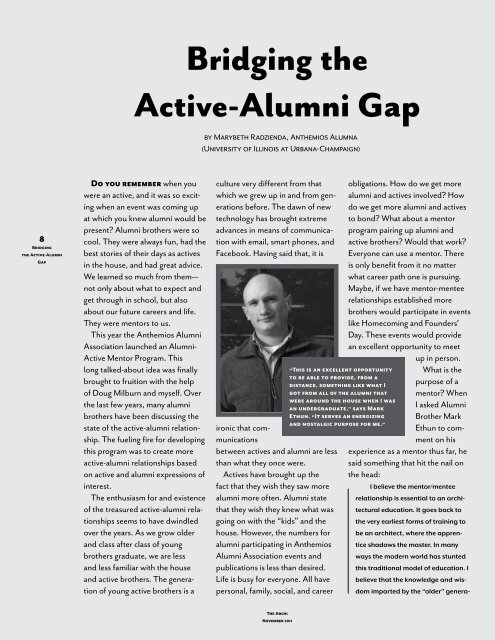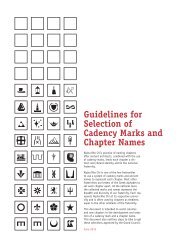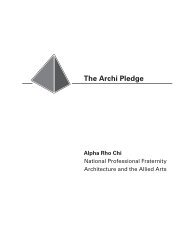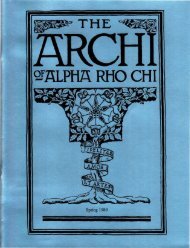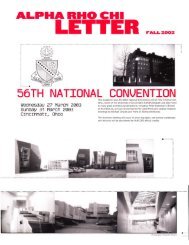The Archi - November 2011 - Alpha Rho Chi
The Archi - November 2011 - Alpha Rho Chi
The Archi - November 2011 - Alpha Rho Chi
Create successful ePaper yourself
Turn your PDF publications into a flip-book with our unique Google optimized e-Paper software.
Bridging the<br />
Active-Alumni Gap<br />
by Marybeth Radzienda, Anthemios Alumna<br />
(University of Illinois at Urbana-Champaign)<br />
8<br />
Bridging<br />
the Active-Alumni<br />
Gap<br />
Do you remember when you<br />
were an active, and it was so exciting<br />
when an event was coming up<br />
at which you knew alumni would be<br />
present? Alumni brothers were so<br />
cool. <strong>The</strong>y were always fun, had the<br />
best stories of their days as actives<br />
in the house, and had great advice.<br />
We learned so much from them—<br />
not only about what to expect and<br />
get through in school, but also<br />
about our future careers and life.<br />
<strong>The</strong>y were mentors to us.<br />
This year the Anthemios Alumni<br />
Association launched an Alumni-<br />
Active Mentor Program. This<br />
long talked-about idea was finally<br />
brought to fruition with the help<br />
of Doug Milburn and myself. Over<br />
the last few years, many alumni<br />
brothers have been discussing the<br />
state of the active-alumni relationship.<br />
<strong>The</strong> fueling fire for developing<br />
this program was to create more<br />
active-alumni relationships based<br />
on active and alumni expressions of<br />
interest.<br />
<strong>The</strong> enthusiasm for and existence<br />
of the treasured active-alumni relationships<br />
seems to have dwindled<br />
over the years. As we grow older<br />
and class after class of young<br />
brothers graduate, we are less<br />
and less familiar with the house<br />
and active brothers. <strong>The</strong> generation<br />
of young active brothers is a<br />
culture very different from that<br />
which we grew up in and from generations<br />
before. <strong>The</strong> dawn of new<br />
technology has brought extreme<br />
advances in means of communication<br />
with email, smart phones, and<br />
Facebook. Having said that, it is<br />
ironic that communications<br />
between actives and alumni are less<br />
than what they once were.<br />
Actives have brought up the<br />
fact that they wish they saw more<br />
alumni more often. Alumni state<br />
that they wish they knew what was<br />
going on with the “kids” and the<br />
house. However, the numbers for<br />
alumni participating in Anthemios<br />
Alumni Association events and<br />
publications is less than desired.<br />
Life is busy for everyone. All have<br />
personal, family, social, and career<br />
“This is an excellent opportunity<br />
to be able to provide, from a<br />
distance, something like what I<br />
got from all of the alumni that<br />
were around the house when I was<br />
an undergraduate,” says Mark<br />
Ethun. “It serves an energizing<br />
and nostalgic purpose for me.”<br />
obligations. How do we get more<br />
alumni and actives involved? How<br />
do we get more alumni and actives<br />
to bond? What about a mentor<br />
program pairing up alumni and<br />
active brothers? Would that work?<br />
Everyone can use a mentor. <strong>The</strong>re<br />
is only benefit from it no matter<br />
what career path one is pursuing.<br />
Maybe, if we have mentor-mentee<br />
relationships established more<br />
brothers would participate in events<br />
like Homecoming and Founders’<br />
Day. <strong>The</strong>se events would provide<br />
an excellent opportunity to meet<br />
up in person.<br />
What is the<br />
purpose of a<br />
mentor? When<br />
I asked Alumni<br />
Brother Mark<br />
Ethun to comment<br />
on his<br />
experience as a mentor thus far, he<br />
said something that hit the nail on<br />
the head:<br />
I believe the mentor/mentee<br />
relationship is essential to an architectural<br />
education. It goes back to<br />
the very earliest forms of training to<br />
be an architect, where the apprentice<br />
shadows the master. In many<br />
ways the modern world has stunted<br />
this traditional model of education. I<br />
believe that the knowledge and wisdom<br />
imparted by the “older” genera-<br />
<strong>The</strong> <strong>Archi</strong><br />
<strong>November</strong> <strong>2011</strong>


